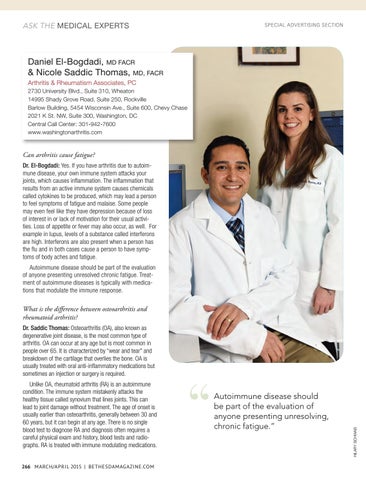Ask The Medical Experts
Special Advertising Section
Daniel El-Bogdadi, MD FACR & Nicole Saddic Thomas, MD, FACR Arthritis & Rheumatism Associates, PC 2730 University Blvd., Suite 310, Wheaton 14995 Shady Grove Road, Suite 250, Rockville Barlow Building, 5454 Wisconsin Ave., Suite 600, Chevy Chase 2021 K St. NW, Suite 300, Washington, DC Central Call Center: 301-942-7600 www.washingtonarthritis.com
Can arthritis cause fatigue? Dr. El-Bogdadi: Yes. If you have arthritis due to autoimmune disease, your own immune system attacks your joints, which causes inflammation. The inflammation that results from an active immune system causes chemicals called cytokines to be produced, which may lead a person to feel symptoms of fatigue and malaise. Some people may even feel like they have depression because of loss of interest in or lack of motivation for their usual activities. Loss of appetite or fever may also occur, as well. For example in lupus, levels of a substance called interferons are high. Interferons are also present when a person has the flu and in both cases cause a person to have symptoms of body aches and fatigue. Autoimmune disease should be part of the evaluation of anyone presenting unresolved chronic fatigue. Treatment of autoimmune diseases is typically with medications that modulate the immune response.
Dr. Saddic Thomas: Osteoarthritis (OA), also known as degenerative joint disease, is the most common type of arthritis. OA can occur at any age but is most common in people over 65. It is characterized by “wear and tear” and breakdown of the cartilage that overlies the bone. OA is usually treated with oral anti-inflammatory medications but sometimes an injection or surgery is required. Unlike OA, rheumatoid arthritis (RA) is an autoimmune condition. The immune system mistakenly attacks the healthy tissue called synovium that lines joints. This can lead to joint damage without treatment. The age of onset is usually earlier than osteoarthritis, generally between 30 and 60 years, but it can begin at any age. There is no single blood test to diagnose RA and diagnosis often requires a careful physical exam and history, blood tests and radiographs. RA is treated with immune modulating medications.
“
Autoimmune disease should be part of the evaluation of anyone presenting unresolving, chronic fatigue.”
hilary schwab
What is the difference between osteoarthritis and rheumatoid arthritis?
266 March/April 2015 | BethesdaMagazine.com
2015 B Medical Experts.indd 266
2/9/15 12:36 PM
